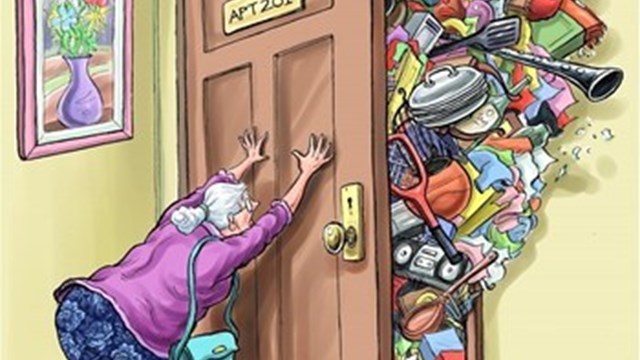
Q. I live in a mid-rise condominium, and my next door neighbor is a hoarder. She frequently leaves her door open, so it’s easy to see that there’s a serious problem. I complained to the building management several times, but nothing has improved. The smell is awful; I have a feeling that her unit has mice, roaches, and probably other vermin, too. What can I do?
—Disgusted Neighbor
A. “Addressing the challenges of having a hoarder in the community is always difficult,” says Scott J. Sander Jr. of Sandler & Hansen, LLC, in Middletown, Connecticut. “On the one hand, the association is concerned about the health and safety of the residents. On the other hand, hoarding is recognized as a disability, and even the hoarder him- or herself may be frustrated with the condition.
“Associations are typically empowered to address health and safety issues, but the practical use of that power is limited. Imposing a fine is unlikely to adequately resolve this problem. In many cases, the hoarder simply cannot stop them themselves. Entering the hoarder’s unit and clearing it out against his or her will is also problematic, opening the association to any number of potential legal claims. And since hoarding is a disability, the association must proceed very carefully because it could be accused of violating federal fair housing laws, which prohibit housing providers (including community associations) from discriminating against protected classes, including people with disabilities.
“The governing documents of many communities contain provisions that prohibit behavior that interferes with the rights of other owners to peacefully enjoy the use of their units. Many owners expect the association to enforce these provisions. However, these provisions are incorporated into the governing documents to provide owners with their own causes of action against a neighbor who is interfering with the peaceful enjoyment of their unit. An owner may sue his or her neighbor to curb such activity. And unlike the association, the owner is not constrained by fair housing laws because he or she is not a housing provider.
“Clearly, this is an issue for which there is no clean and easy resolution. That said, I recommend the following in the hopes of finding a solution:
“Attempt to address the issue directly with the hoarding resident. I have seen situations where the hoarder does clean up the unit when the association raises the issue. Because of the nature of the disability, however, it may be necessary to raise the issue repeatedly over the years, as the hoarder tends to relapse periodically.
“If known, contact the members of the hoarder’s family. Let them know that the community is concerned for the safety of the hoarder and that of his or her neighbors.
“Contact local health and safety authorities, such as the fire marshal, the building inspector, or the department of health and human services. Again, let them know that the community is concerned for the safety of the hoarder and that of his or her neighbors.
“Remind the neighbors of their right to seek a legal remedy on their own behalf. Sometimes, it makes more sense for an individual owner to proceed with his or her own legal action, rather than association doing so at the expense of the community.”









Leave a Comment